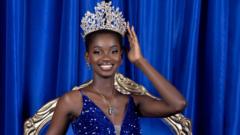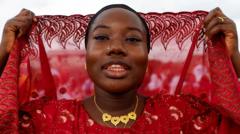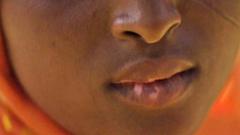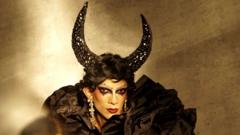The Miss Ivory Coast competition is shifting its standards of beauty by prohibiting wigs and extensions, encouraging contestants to embrace their natural hair. This change has sparked a discussion about beauty norms and cultural identity, while also having potential economic implications for the local hair industry.
Embracing Natural Beauty: Pageants in Ivory Coast Challenge Wig Culture

Embracing Natural Beauty: Pageants in Ivory Coast Challenge Wig Culture
The Miss Ivory Coast pageant has introduced groundbreaking changes, banning wigs and extensions to celebrate natural hair among contestants.
In a significant move that could reshape perceptions of beauty in West Africa, the Miss Ivory Coast pageant has introduced new rules banning the use of wigs, weaves, and hair extensions during preliminary stages. This initiative aims to promote natural beauty among contestants, a striking departure from the longstanding preference for long, flowing artificial hair that has dominated beauty competitions.
Marlène-Kany Kouassi’s victory in 2022 as Miss Ivory Coast, sporting her natural hair, was a rare exception in a pageant history spanning over six decades. As the only second winner to do so, her win marked a milestone against prevailing Western beauty standards often embraced by contestants and judges alike.
The recent restructuring by Victor Yapobi, president of the organizing committee, aims to celebrate raw beauty. "We want the candidates to be natural – whether with braids or straightened hair, it should be their own," said Yapobi, underlining the goal to empower young women to embrace their true selves. Along with the hair rule, changes include raising the maximum age for entrants to 28, lowering the entrance fee, and expanding height requirements to include shorter candidates.
While some contestants, like real estate agent Emmanuella Dali, welcome the new direction, declaring it a source of pride, others express concern. Makeup artist Astrid Menekou states, "I love wigs," indicating that for many, wigs serve as a personal expression of style and creativity. The new rules have spurred discussions around the definitions of beauty and identity among participants, with many reconsidering their view on natural versus artificial hair.
However, this change does not come without consequences. The Ivorian hair industry, valued at over $300 million annually, may feel the economic pinch as hairdressers voice worries over decreased business. “This rule is not good for us,” laments hairdresser Ange Sea, emphasizing the financial impact of this trend.
Despite the challenges, the initiative aligns with a growing global movement advocating for natural hair acceptance among women of color. As beauty influencers share tips on managing natural hair, societal perceptions are gradually shifting, challenging norms that traditionally favored wigs.
The response from the public and contestants has been largely supportive, hinting at a potential cultural shift. Yapobi noted that congratulations and encouragement have been pouring in from both local and international communities, reflecting a desire to return to authentic beauty standards.
As the competition heads to the finals in June 2025, the decision regarding the wig ban for top contestants remains unannounced. Nevertheless, the evolving conversation about beauty norms within beauty pageants poses an opportunity for greater acceptance of diverse hairstyles in Ivory Coast and beyond, fostering a culture that champions both natural and styled hair.
For Doria Koré, crowned Miss Haut-Sassandra, winning with her natural hair represents a triumph of cultural and self-acceptance. Similarly, contestant Dali leaves the competition feeling empowered; "I didn't win, but I feel proud. This is who I am." This shift not only influences the pageantry scene but also echoes broader societal changes in defining beauty and identity in Africa.
















